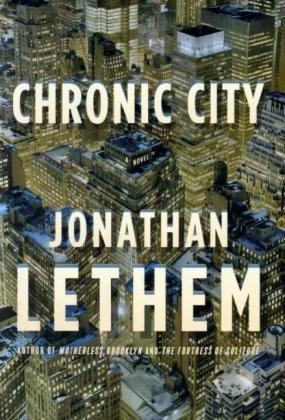
 Chronic City by Jonathan Lethem
Chronic City by Jonathan Lethem
Jonathan Lethem’s Chronic City has lots to admire: great lines, witty jokes and good insights. Unfortunately, there’s a lot more to admire here than to enjoy. The sum ended up being less than its parts, to me. This may have been part of the point, and certainly the sense of disconnectedness is as well, but one of the dangers of a novel about disconnectedness is that it can feel, well, disconnected. The trick is to avoid this somehow, and I can’t say Lethem succeeds here.
Chronic City is set in an alternate Manhattan where a mysterious “Tiger” is wreaking infrastructural havoc from underground (what the Tiger really is remains a mystery for some time, or, depending on your reading, forever), a strange gray fog hovers over the financial district, and it snows in summer. Over the city, a sick female astronaut — Janice Trumbull — is orbiting, stuck on a space station that is slowly dying with its crew.
The story is told mostly through the eyes of Chase Insteadman, former child TV star and Janice’s fiancé. Early on, Chase is introduced to Perkus Tooth, a critic of many sorts, a conspiracy-believer, an obsessive referent (to movies, music, etc), and an indefatigable pot smoker. As the book progresses, a few other characters are added to the small circle of Chase’s life — a ghostwriter named Oona, an aide to the billionaire mayor of the city, and a handful of others — and we also get to read Janice’s letters to Chase.
Lethem is influenced by several authors here; you’ll get whiffs of Thomas Pynchon, Don DeLillo, and Paul Auster. And in some ways he nails those bits, but it’s kind of like a pitch-perfect mimic who doesn’t quite have the same presence as whatever he is imitating. That isn’t to say Chronic City is derivative — it has the feel of those three writers’ work but Lethem has definitely made these elements his own — but the end result and overall effect feel lacking. It’s kind of like the opposite of an Impressionist painting. It holds together in small pieces, but the more you step back the less it does so, until it just blurs away.
The plot, what there is, isn’t particularly compelling and the first 200 pages were a chore to get through. In fact, were it not for it being Lethem, I would have stopped after 100. Were it not a review book, I would have quit despite it being Lethem at 175-200. It does pick up past that point and become stronger, but not leaps and bounds better. Pacing remains an issue throughout. One major aspect of the plot, the quest for the chaldron (it’s a long story) just never felt real to me. Another aspect, which felt like it wanted to be a revelation, seemed a bit too obvious.
The drifting, aimless characters, like the plot, don’t hold a lot of interest as characters in their own right (as opposed to character types). I can’t say I truly cared what happened to any of them. Their search for truth never feels organic, as if it bubbles up from within the characters or drives them naturally. The onslaught of references — to movies, to music, to books and authors — offers up its moments of humor or self-satisfaction or preening superiority (“how many other readers will get that reference?”), but wears thin before long. Chronic City has a cooler, more crafted and detached sense than the warmer intimacy of Pynchon. Lethem’s references seem to exclude even when you get the reference, while Pynchon, for whatever reason, feels more inclusive, welcoming you into the club no matter how befuddled you might feel. Or even if it’s the wrong club. And the setting felt too claustrophobically centered on Manhattan, which is probably more my problem than Lethem’s.
My favorite parts, beyond the wonderfully written sentences, were the alternate reality segments: the Tiger, the fog, the dogs (another long story). They are handled with a nice light touch, and I could have done with more of the same.
In the end, Chronic City was a disappointment. It was a tough go for the first 200 pages and the characters and plot didn’t really hold interest. What redeemed it somewhat, though not enough to garner a recommendation, were its smaller points, the great lines scattered throughout the work and those wonderful off-center alternate-reality moments. Had Lethem brought this in at a Crying of Lot 49 or Paul Auster length, I think it could have really shone, but at nearly 500 pages it gets bogged down by its own size, obscuring the novel’s gems.



I've thought about picking that one up. The artwork looks perfect.
I like the way you think, Bill. I found the second one particularly objectionable; the one with Khan. It was…
I find if I take every Trek reference out of them (the title, the character names, the ship names, etc.),…
I loved this deep dive into Edwige Fenech's Giallo films! Her performances add such a unique flavor to the genre.…
It would give me very great pleasure to personally destroy every single copy of those first two J. J. Abrams…